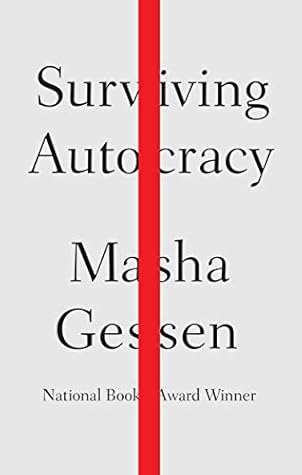More on this book
Community
Kindle Notes & Highlights
When Mexico sends its people, they’re not sending their best. They’re not sending you. They’re not sending you. They’re sending people that have lots of problems, and they’re bringing those problems with us [sic]. They’re bringing drugs. They’re bringing crime. They’re rapists. And some, I assume, are good people. But I speak to border guards and they tell us what we’re getting. And it only makes common sense. It only makes common sense. They’re sending us not the right people. It’s coming from more than Mexico. It’s coming from all over South and Latin America, and it’s coming
...more
the system is not designed to deal with a president like Trump—a bad-faith actor, one who rejects the possibility that his power should be limited by institution or tradition. Trump deals with the courts, the law, and society the way a New York real estate developer would deal with city hall and the neighbors—by pushing stubbornly ahead and looking for loopholes.
In January 2019, Trump gave his first televised Oval Office address—to campaign for Wall funding. He spoke about the dangerous immigrant criminals again, claiming falsely that “day after day, precious lives are cut short by those who have violated our borders.” He enumerated crimes—stabbings, rapes, and beatings—and demanded, “How much more American blood must we shed before Congress does its job?”
If the bloodshed of innocent Americans was an actual concern, President Trump would have led an effort to reduce the homicide rate due to gun violence.
twenty-eight-year-old Ocasio-Cortez had won a Democratic primary against a longtime incumbent. At the time of making this comment, she had been in office for less than a week. A year and a half later, she would similarly step forward to call things as they are, this time speaking about detention facilities for migrants. After reporters at The New York Times and the El Paso Times broke the story of deplorable conditions at a detention center near the border and more information on similar centers followed, Ocasio-Cortez secured a visit to such a facility. In a livestream, she used the term
...more
shouting match about the Holocaust in which the Holocaust Museum in Washington also criticized Ocasio-Cortez. As is always the case with such debates, one side argued that nothing can be as bad as the Holocaust, therefore nothing can be compared to it; the other argued that the cautionary lesson of history can be learned only by acknowledging the similarities between now and then.
Autocratic power requires the degradation of moral authority—not the capture of moral high ground, not the assertion of the right to judge good and evil, but the defeat of moral principles as such.
Cummings had issued at the beginning of impeachment proceedings, just a few weeks before his death: “When the history books are written about this tumultuous era, I want them to show that I was among those in the House of Representatives who stood up to lawlessness and tyranny.” She added another Cummings quote, this one from the conclusion of a February 2019 hearing at which Trump’s personal lawyer Michael Cohen, then already on his way to jail, had testified. Cummings said, “When we are dancing with the angels, the question will be, did we—what did we do to make sure we kept our democracy
...more
Trump got elected on the promise of a return to an imaginary past—a time we don’t remember because it never actually was, but one when America was a kind of great that Trump has promised to restore. Trump shares this brand of nostalgia with Putin, who has spent the last seven years talking about Russian “traditional values,” with Viktor Orbán, who has warned LGBT people against becoming “provocative,” and with any number of European populists who promise a return to a mythical “traditional” past.
Trump calls out to the worst in his people.
Speaking on immigration, he referred to members of the gang MS-13 as “animals.” When he was criticized, he said it again and again. “I called them ‘animals’ the other day and I was met with rebuke,” he said. “They said, ‘they’re people.’ They’re not people. They’re animals. We have to be very, very tough.” Dehumanizing people so blatantly is not alien to American public discourse—it was a hallmark of the way the George W. Bush administration talked about terrorists—but Trump uses this weapon more widely and with ever more gusto, inviting his supporters to join him in demonizing the Other.
Hate crimes in the United States surged following the 2016 election. Three political scientists from Texas compared hate-crime statistics from counties where Trump had held campaign rallies to demographically similar counties where rallies were not held—and concluded th...
This highlight has been truncated due to consecutive passage length restrictions.
It was as if the virus and the president were working in concert. Not only did the pandemic cripple the existing political system, it demanded that Trump govern in precisely the manner to which he aspired: unilaterally, decisively, with few checks on his power—and with the eyes of the nation riveted to him. And though he had little interest in understanding the problem; though he was reluctant to use his executive power actually to fight the pandemic; though he was inconsistent and apparently incapable of staying on point, showing empathy, or comprehending the gravity of the situation—he still
...more
In The Origins of Totalitarianism, Hannah Arendt identified a key precondition: “Only where great masses are superfluous or can be spared without disastrous results of depopulation is totalitarian rule, as distinguished from a totalitarian movement, at all possible.”


